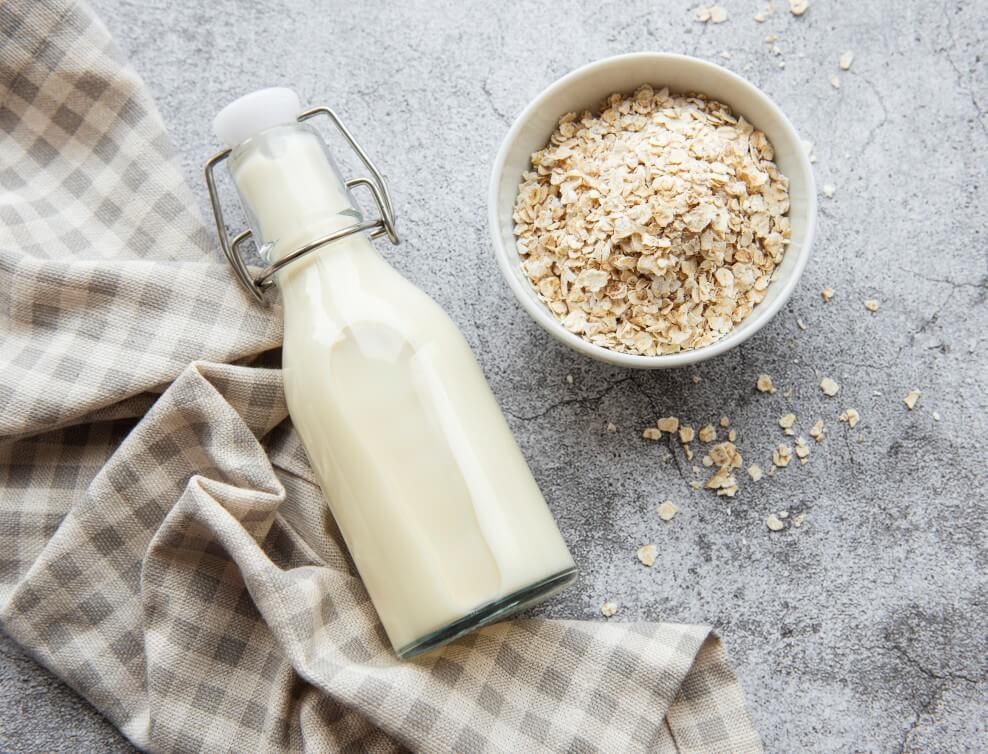You may have heard that allergy tests don't work on oat milk because it doesn't naturally contain any of the histamines that cause allergic reactions.
While there is probably some truth to that, does this mean you can't be allergic to oat milk?
Oat milk is an allergen that can cause severe symptoms in those who are allergic to a protein in oats called avenin. Symptoms include blotchiness, runny nose, itchy eyes, nausea, and, in severe cases, anaphylaxis.
There are a lot of underlying causes that may be causing your stomach ache or other symptoms from drinking oat milk, so it’s always a good idea to keep tabs on your health and allergy profile before converting to a milk alternative.
The rest of this article will go into depth on the symptoms of oat milk allergy and discuss other ways oat milk can affect your body.
Signs of Oat Milk Allergy
Oat milk is a great alternative for people with dairy, soy, or tree nut allergies. In addition, oat milk is great for avoiding gluten, but only if the carton is labeled gluten-free.
You always need to be on the lookout for cross-contamination when trying to avoid gluten.
If you are allergic to oats, then oat milk is not a good idea, as ingesting oat milk in high quantities may trigger your allergies and can cause severe reactions from your body.
In some people, the protein avenin, which is found in oats, is treated as a foreign substance and is attacked by the body, causing a lot of symptoms of oat allergy to manifest.
Some mild symptoms of oat milk allergy include:
- Irritated skin
- Blotchiness
- Rashes around and inside the mouth
- Scratchy throat
- Runny nose
- Nausea
- Vomiting
- Diarrhea
- Stomach pain
Related: Is Oat Milk Healthy?
Any of these symptoms are indicative of your body’s attempt to purge avenin from your system and will cause you to react negatively anytime you consume oats.
A reaction will be more severe if you ingest more of the allergen causing the issue.
The most severe reaction you can have from drinking oats and the number one reason why you should never knowingly ingest a food allergen is anaphylactic shock, which causes blood pressure to drop and airways to tighten up.
Not only does the affected person’s body not get enough oxygen, but they will also have trouble breathing and potentially pass out from a lack of blood flow to the brain.
If you notice any of these symptoms after consuming oat milk, call for help immediately. Anaphylaxis is life-threatening and must be treated immediately.
- Wheezing
- Tightness in the chest
- Swollen tongue and throat
- Dizziness and confusion
- A sudden drop in blood pressure
- Collapse or fainting
Here's a helpful video from Medic Centric with more tips on identifying a food allergy.
Take precautions if you suspect you have an allergy to oat milk and visit an allergist, who can effectively determine whether you have an allergy or if there is another underlying cause.
Your allergist can perform a series of tests to determine whether you are allergic to a substance.
They may insert a small amount of the allergen in the skin under your forearm to see if your body reacts or place a patch on your back or arm to see if your reaction is delayed.
Related: How to Use Oat Milk On Your Skin
You may also be prompted to ingest oats in increasing quantities to see if a reaction occurs.
Of course, this should only be done with medical professionals on hand to monitor your wellbeing and treat and severe reactions.
Many people with severe food allergies carry an EpiPen, which can be used to quickly inject the body with epinephrine, halting the effects of anaphylactic shock.

Can You Be Allergic to Oats and Not Oat Milk?
Oat milk still contains avenin, the protein that the body of an allergic person treats as a hostile intruder, so consuming oat milk is not safe for someone with an oat allergy.
If you think about it, oat milk is just very tiny bits of oats making a liquid consistency, so there’s no less danger in consuming a bunch of tiny oat grains than eating oats whole.
The avenin is not removed during the process since the oats are only soaked, mixed, and strained.
There’s the same degree of risk consuming either, so if you have a severe reaction when eating oats, then you should avoid oat milk in any form.

Is Oat Milk Safe for Babies with Allergies?
Oat milk is not suited to meet the needs of any baby, much less babies with allergies.
There’s a reason why babies gravitate towards breastfeeding until a certain age.
Their mother’s milk contains a wide profile of essential nutrients they need to grow and be sustained.
You shouldn’t give anything other than breastmilk to your baby until they are at least a year old.
Related: Can Babies Drink Oat Milk?
Final Thoughts
Oat milk is a great option to avoid a lot of allergies―dairy, soy, gluten, nuts―but, of course, oats themselves are also an allergen to some people.
You should always exercise caution if you don’t know whether you have an oat allergy.
Any potential allergen should be sampled in small quantities to see if a reaction occurs.
If so, then you’ll notice that your stomach and bowels will be out of order for a few days. You may also have a runny nose, scratchy throat, and blotchy skin.
You should always treat an oat allergy seriously and if you suspect you have a service oat allergy, you should visit your medical provider to get diagnosed.
They will probably outfit you with an EpiPen to keep you safe from the risk of anaphylactic shock.
Beware tightness in the throat, trouble breathing, or dizziness as symptoms of anaphylaxis and always have your EpiPen on hand for medical emergencies.
All in all, oat milk is great for those wanting a high-fiber, low calorie alternative to dairy milk, and if you don’t have an oat allergy, then the rich, creamy taste of oat milk might be the right pick for you.
